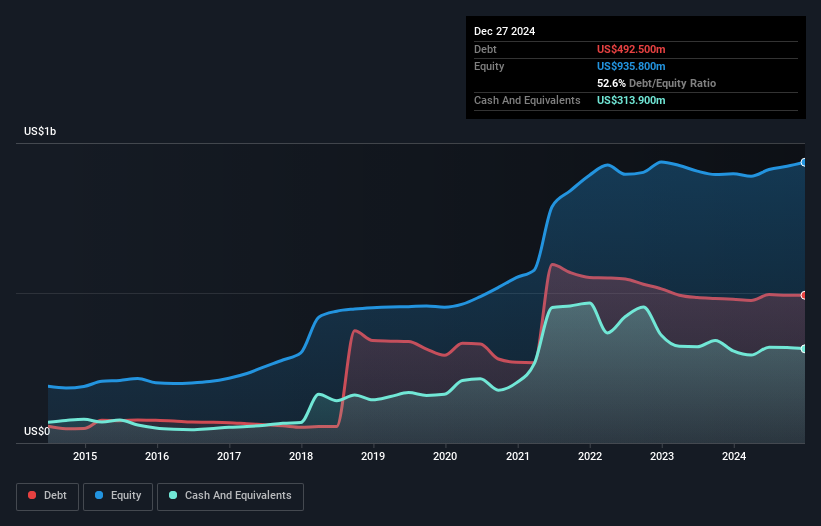
Howard Marks put it nicely when he said that, rather than worrying about share price volatility, 'The possibility of permanent loss is the risk I worry about... and every practical investor I know worries about.' So it might be obvious that you need to consider debt, when you think about how risky any given stock is, because too much debt can sink a company. Importantly, Ultra Clean Holdings, Inc. (NASDAQ:UCTT) does carry debt. But the more important question is: how much risk is that debt creating?
Our free stock report includes 2 warning signs investors should be aware of before investing in Ultra Clean Holdings. Read for free now.When Is Debt A Problem?
Debt and other liabilities become risky for a business when it cannot easily fulfill those obligations, either with free cash flow or by raising capital at an attractive price. In the worst case scenario, a company can go bankrupt if it cannot pay its creditors. While that is not too common, we often do see indebted companies permanently diluting shareholders because lenders force them to raise capital at a distressed price. Having said that, the most common situation is where a company manages its debt reasonably well - and to its own advantage. The first step when considering a company's debt levels is to consider its cash and debt together.
What Is Ultra Clean Holdings's Net Debt?
As you can see below, Ultra Clean Holdings had US$492.5m of debt, at December 2024, which is about the same as the year before. You can click the chart for greater detail. However, it also had US$313.9m in cash, and so its net debt is US$178.6m.

A Look At Ultra Clean Holdings' Liabilities
According to the last reported balance sheet, Ultra Clean Holdings had liabilities of US$335.6m due within 12 months, and liabilities of US$648.5m due beyond 12 months. Offsetting these obligations, it had cash of US$313.9m as well as receivables valued at US$241.1m due within 12 months. So it has liabilities totalling US$429.1m more than its cash and near-term receivables, combined.
Ultra Clean Holdings has a market capitalization of US$840.8m, so it could very likely raise cash to ameliorate its balance sheet, if the need arose. But it's clear that we should definitely closely examine whether it can manage its debt without dilution.
See our latest analysis for Ultra Clean Holdings
We use two main ratios to inform us about debt levels relative to earnings. The first is net debt divided by earnings before interest, tax, depreciation, and amortization (EBITDA), while the second is how many times its earnings before interest and tax (EBIT) covers its interest expense (or its interest cover, for short). This way, we consider both the absolute quantum of the debt, as well as the interest rates paid on it.
Given net debt is only 1.1 times EBITDA, it is initially surprising to see that Ultra Clean Holdings's EBIT has low interest coverage of 2.2 times. So one way or the other, it's clear the debt levels are not trivial. Pleasingly, Ultra Clean Holdings is growing its EBIT faster than former Australian PM Bob Hawke downs a yard glass, boasting a 127% gain in the last twelve months. When analysing debt levels, the balance sheet is the obvious place to start. But it is future earnings, more than anything, that will determine Ultra Clean Holdings's ability to maintain a healthy balance sheet going forward. So if you want to see what the professionals think, you might find this free report on analyst profit forecasts to be interesting.
But our final consideration is also important, because a company cannot pay debt with paper profits; it needs cold hard cash. So we clearly need to look at whether that EBIT is leading to corresponding free cash flow. In the last three years, Ultra Clean Holdings created free cash flow amounting to 3.0% of its EBIT, an uninspiring performance. For us, cash conversion that low sparks a little paranoia about is ability to extinguish debt.
Our View
Ultra Clean Holdings's interest cover and conversion of EBIT to free cash flow definitely weigh on it, in our esteem. But its EBIT growth rate tells a very different story, and suggests some resilience. We think that Ultra Clean Holdings's debt does make it a bit risky, after considering the aforementioned data points together. That's not necessarily a bad thing, since leverage can boost returns on equity, but it is something to be aware of. There's no doubt that we learn most about debt from the balance sheet. But ultimately, every company can contain risks that exist outside of the balance sheet. Be aware that Ultra Clean Holdings is showing 2 warning signs in our investment analysis , you should know about...
When all is said and done, sometimes its easier to focus on companies that don't even need debt. Readers can access a list of growth stocks with zero net debt 100% free, right now.
Have feedback on this article? Concerned about the content? Get in touch with us directly. Alternatively, email editorial-team (at) simplywallst.com.
This article by Simply Wall St is general in nature. We provide commentary based on historical data and analyst forecasts only using an unbiased methodology and our articles are not intended to be financial advice. It does not constitute a recommendation to buy or sell any stock, and does not take account of your objectives, or your financial situation. We aim to bring you long-term focused analysis driven by fundamental data. Note that our analysis may not factor in the latest price-sensitive company announcements or qualitative material. Simply Wall St has no position in any stocks mentioned.